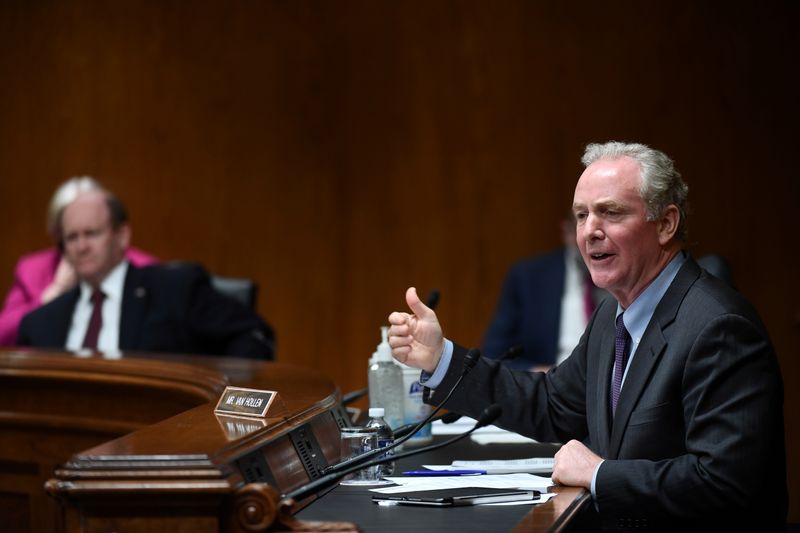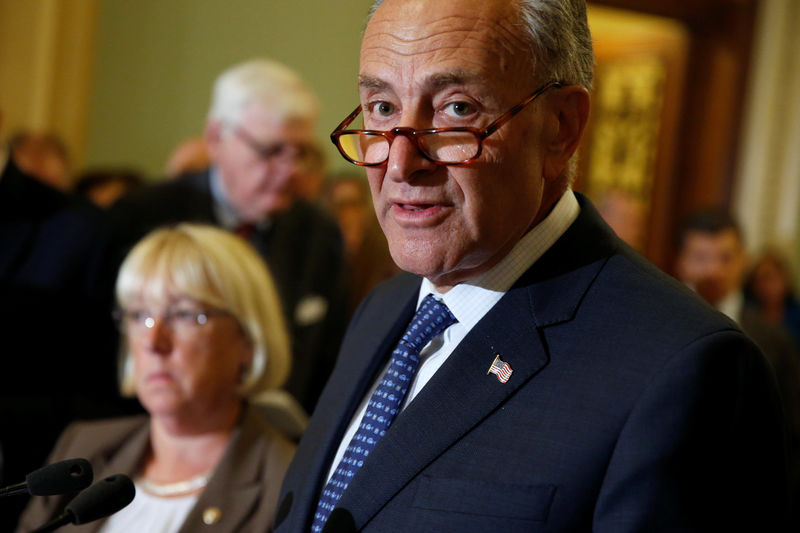By Katanga Johnson and Pete Schroeder
WASHINGTON (Reuters) - Democratic U.S. lawmakers will seek to repeal a regulation introduced during former President Donald Trump's administration that they said allows predatory lenders to skirt state consumer protections - a setback for financial technology firms that stand to benefit from the rule.
Senator Chris Van Hollen and Senate Banking Committee Chairman Sherrod Brown on Thursday announced the introduction of a Senate resolution to rescind the so-called "true lender" rule. Congressman Chuy Garcia is set to introduce a House of Representatives version of the resolution on Friday, his office said.
The measure represents the first https://www.reuters.com/article/us-usa-election-finance-exclusive/exclusive-center-for-american-progress-takes-aim-at-trumps-wall-street-friendly-rules-idUSKCN26C1GW move by congressional Democrats to try to rescind one of several Trump-era regulations that they and advocacy groups have said hurt consumers and increased systemic risks.
The resolution, if passed, would overturn the rule using the Congressional Review Act, a 1996 law that empowers Congress to reverse recently finalized federal regulations. Passage would require only a simple majority vote in the two chambers. Democrats hold slim majorities in the House and Senate.
Killing the "true lender" rule, which was introduced by the Office of the Comptroller of the Currency (OCC) last year, would deal a blow to financial technology firms that had wanted legal certainty as to whether state or federal rules applied when partnering with traditional lenders.
Democrats have argued that the rule allows financial technology firms to evade state usury laws and rate caps by partnering with banks that are subject to looser federal lending rules.
"We will not let this rule stand - nor will we sit idly by as predatory lenders attempt to take advantage of hard-working Americans," Van Hollen told Reuters in a statement.
Brown in a statement called the rule "a shameful attack on states' ability to protect their citizens from predatory loans."
"Predatory lending has no place in the federal banking system," OCC spokesman Bryan Hubbard said in a statement. "Rather than encouraging abusive lending, the OCC rule provides regulatory certainty regarding the responsibility and accountability of a bank's lending."
The OCC said when finalizing the rule in October that it aimed to clarify who is considered the "true lender" when institutions team up to issue a loan, which in turn would determine what requirements the loans must meet.
The OCC determined that if the bank is named as the lender in the loan agreement, then the relevant bank rules apply. In the case of nationally chartered banks, for example, federal banking rules - typically more relaxed when it comes to lending rates - would apply to the loan.
The OCC said that the ongoing legal uncertainty as to which rules apply to such partnerships had risked chilling innovative lending relationships, which could in turn restrict access to affordable credit.
On Monday, a coalition of liberal advocates called https://www.nclc.org/media-center/days-before-crucial-deadline-the-national-consumer-law-center-joins-over-300-groups-calling-for-congress-to-rescind-fake-lender-rule-that-facilitates-predatory-loan-schemes.html on lawmakers to rescind the rule, saying it enables lenders "to charge triple-digit interest rates, target the financially vulnerable and communities of color and trap consumers in devastating cycles of debt."
In January, seven U.S. states and Washington, D.C., sued the OCC seeking to void the rule.
The Congressional Review Act is considered a blunt but powerful legal tool because it bans agencies from penning a substantively similar rule in future.

Industry groups said if the effort to undo the regulation is successful, the overall effect may be a reduction of credit for consumers.
